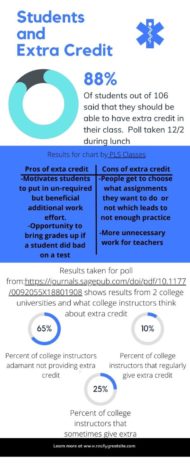Extra credit has pros and cons
January 19, 2022
At the end of every quarter, stress radiates from students across the school as the grades start piling in and the weight of every failed assignment sets in. As struggling students look for a chance to bring their grades up before time runs out, extra credit comes in.

FCPS extra credit rules state that teachers may give extra credit assignments, but students will not be given extra credit or grades for activities such as bringing in classroom materials, providing parent/guardian signatures, participating in fundraising/charitable events, or participating in non-curricular activities.
The school district also states that retakes for assessments can give students a chance to get the test grade to 80%. Retakes are a form of extra credit as it provides students an optional chance to bring their grades up and learn from their mistakes.
“I believe in re-doing work or turning in missing assignments instead of adding new ones,” science teacher Kaitlyn Sullivan said, “I do not want to add more work.”
Research by PLS Classes shows that believing there will be a future opportunity to earn points back, students may knowingly skip or underperform on an assignment, or not prepare thoroughly enough for a test, which leads to bad grades
“[Giving] students extra credit [allows] them to skip assignments and activities,” French teacher Jocelyn Smith said. “Students can choose what assignments to do because they get a chance to make everything up in other ways.”
The end of the year is not all that matters as semester grades are also reported to the colleges students apply to.
“Near the end of the quarter [and] year, I feel pressured because it is nearly impossible to [achieve] a meaningful grade boost without extra credit when so many assignments have been entered in,” junior Swastik Agarwal said.
Extra credit can provide additional practice for subjects students are struggling with, while also giving students a chance to show their knowledge
“The majority of [extra credit] activities are fully optional and give students a chance to show their knowledge,” Agarwal said “Test corrections are the most fair form of extra credit as they provide students a chance to learn [from] mistakes as well as bringing their grade up.”
A study by Thomas Guskey shows that retakes are the most productive form of extra credit as they reduce anxiety for tests, give students a chance to show what they know and have learned and provide students a chance to learn from what they did wrong so that they do better the following time.
“I encourage my students to retake [as] it helps to increase their grade [and] it does not add more [home] work” Sullivan said.
A study by Huber Izienicki and Scott Setchfield shows that 60-70% of college instructors don’t believe in offering extra credits offering extra credit to students that slack off Most of the college teachers also believe that extra credit can be a cause for unfair grading between classes since some classes may provide extra credit while others do not.
“All students should have the same access to all activities,” Smith said. “[Extra credit] prevents equal opportunity to all students [as it can be different] for every class.”
Different classes can provide different forms of extra credit or have different grading styles for extra credit which can cause some classes to have an advantage over others.
“I would like opportunities for [extra credit] so I can improve or cement my grades, especially near the end of the year [as sometimes] retakes are not significant enough to positively impact my grade,” Agarwal said.





